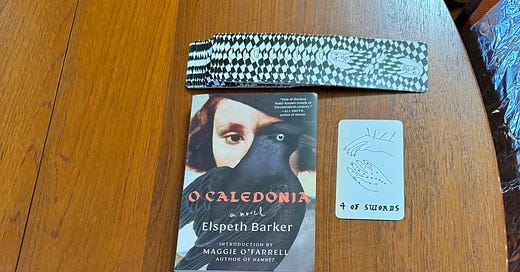LIFE RX 4 NOV 24
the four of swords, and an excerpt from Elspeth Barker’s O Caledonia:
She mused upon her own remote and unalarming death and the arrangements for her funeral which she had for a long time now been inscribing in the back of her special notebook, adding new pleasures as they came to mind. The place was, as always, up in the hills, among the pine groves above the brown and secret pool. There would be bagpipes and there would be Gregorian chants. The Papal Count might be present, as a disembodied voice, singing “Danny Boy,” she was not entirely sure about this. For a little time one faithful dog would sit beside the grave, while others ran and skirmished in merry insouciance along the shadowed woodland paths, possibly flushing out the capercailzie. This was another point of uncertainty, for although he was a kind of genius loci, his demeanour might lower the dignity of the occasion.
the aleatory
The dead do not care. They are not hungry in a sentimental capacity. They are simple. They like warmth, warmth in people, bright places, holidays, glittery greeting cards. They love gravy and tinsel palm trees and sodium lights. But these are mere preferences.
There is always someone who says that the dead watch us with envy and interest. That they follow our naked backs into the steaming bathwater and wish to pluck up our clothes and wear them, and pity themselves.
But the person who will tell you that is almost always selling something, you see. And by conjuring the envious dead, they raise before you an army of grasping hands. A greedy tide. As if the dead yearn toward the canvas duck duffel coat with faux wood toggle buttons for $49.99. As if the dead try to close their vaporous hands around the Japanese steel carving knives stamped with a poetic red square at the hilt, as if the dead would take from you even the mother-of-pearl checkerboard inlay on the chess board, and to defeat them, you must buy the thing and take it home yourself.
Which, of course, if you do, it will yield to you only a strange, stony silence.
The Japanese steel carving knives are themselves, arriving in the moment of sunlight, cutting the block of butter. Silent, but only because they wish not to speak. Not because they have nothing to say.
And there will be no attainment in this.
And there will be no victory.
Yout think you will have pried the Japanese steel carving knives from the hands of the dead, the many dead, the thirsting dead, and made yourself thus victorious. You think you have defeated their shimmering hands by obtaining the chess board, and now it's on your table, and now it's time for lunch, and why are you still alive, and why is the sun coming in at that angle that makes every hair blonde? You yearn and want and hunger. Buying the knives and coat and chessboard did not save you. Now you have an audience, mute and amused, and your stomach is empty again.
If the dead yearned and wanted, they would not be dead.
If anything, they want wanting. They do not want your soup. They want to be hungry for it. They do not want your lover. They want to miss her. They do not want to take from you what you have—only what you don't.
the assignment
Do not try to escape wanting. Don’t compete with the dead.
writing prompt
Let yourself get extremely hungry before you write, then write about wanting. Eat an enormous slice of bread buttered on both sides, then write about wanting.
a chune
“Nation Saving Song” by Lungfish
Song and story are the two arts. A draught and a mineral. Songs are not made up of stories, but can be poured into them for transfer and travel purposes. Stories are not made of songs, but if you tie a few songs to a story you can get it to float over the hills and go both further and farther than it would otherwise (oho). In many—most—ways, they are not related as disciplines. This will be obvious if you ever have the chance to observe a large number of poets or musicians (unstable, great at softball) or a large number of storytellers (stable, but cruel to babysitters). You can’t use stories to save a nation—stories produce psychological time, and I think we’ve all had more than enough of that lately. Songs erase psychological time. They destroy everything before and after an enduring moment. Which is more germane to our saving than you might imagine.
credits: small spells tarot deck by Rachel Howe
O Caledonia by Elspeth Barker
Love Is Love by Lungfish
dear diary, It is the season of darkness. At the diner last night, the waitress said: It’s daylight savings, so nobody is gonna come in here. I had no idea what she meant, and also, it wasn’t true: within 20 minutes, the diner was almost completely full. But I guess that’s the season of darkness for you! I feel an almost full body exhalation of relief into the darkness. Maybe it’s because California is a place of a truly confronting amount of sunlight. It makes you love a little chill. As I get older, I see the wisdom in certain traditions of householding. I used to scorn the kind of women who have boxes of decorations for every season, and a queue of movies they always watch during this or that holiday. But no, there is wisdom in it. It is as good as anything ancestral. We have neighbors up the block who always put out an incredible display of lawn ornaments and inflatables and lights—it’s like an art project that never ends, and I love it. XS




